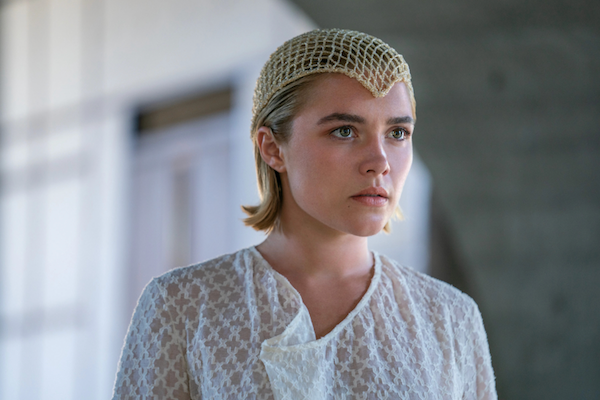Movie review by Greg Carlson
Denis Villeneuve’s “Dune: Part Two” concludes, for the most part, the adaptation of Frank Herbert’s original 1965 science fiction epic while (inevitably?) making room for a further onscreen investigation of “Dune Messiah,” the sequel Herbert described as the inversion of the first section’s “heroic melody.” Even at two hours and forty-five minutes, Villeneuve’s version, which he wrote with Jon Spaihts, truncates and streamlines portions of the book to better shape the material as a polished cinematic object. At its very best, “Dune: Part Two” captures the visual grandeur of Herbert’s accomplished world-building and the complex themes questioning the boundaries of religious prophecy and the dangers of messianic belief.
The delay of the film has now aligned its big screen arrival with the latest intensity of the ongoing conflict of the Israel-Hamas war, a coincidence that – given the seemingly endless and eternal fighting in the Middle East – has already invited mention in think pieces and essays stretching beyond the usual confines of the brief review. Others have articulated interest in the ways this big-budgeted and star-studded juggernaut relies so heavily on clothing and design elements that read as, at best, Muslim cosplay and, at worst, cultural appropriation. Nadeine Asbali’s absolutely fierce takedown challenges viewers not to ignore commodification and erasure.
Hanna Flint’s incisive and fair-minded review in “The New Arab” wrestles with Villeneuve’s shortcomings. Flint, the author of “Strong Female Character,” concentrates a significant portion of her essay on the cinematic representation of the Fremen, pointing out that “Little time is spent in establishing these people and their culture beyond fighting, survival and religious fanaticism.” Additionally, the decision to withhold any deeper insight into “the secret histories and traditions” related to Jessica’s ascendancy within the Bene Gesserit sisterhood maintains a kind of mystical distance that others and exoticizes the sect, which may be, for good or ill, the director’s aim.
As a filmmaker, Villeneuve taps into state-of-the-art digital effects not available to David Lynch in the 1980s. To his credit, Villeneuve has maintained diplomacy and respect for what he calls Lynch’s “fantastic interpretation of the book,” even while admitting that the oft-maligned and ill-fated project contains choices “very far away from my sensibility.” I’m not convinced that Villeneuve’s rendering of the Fremen, to mention one example, has been radically improved. It seems like nearly every line of dialogue spoken by Javier Bardem’s delightfully devoted Stilgar is some variation on “We await your orders, Muad’Dib” or an affirmation that Paul is the Chosen One who will lead the way.
I appreciate the fan theories that Stilgar is shrewdly playing the hand he has been dealt, but even if he is outwardly stuck grinding in low gear, Chani (a righteously skeptical and often pissed-off Zendaya) refuses to drink the Usul-flavored Kool-Aid in a depiction that has drawn the most attention for deviating from the page. Meanwhile, Villeneuve introduces several exciting second-installment performers to sweeten the deal. Bringing the perfect note of regal bearing to Shaddam IV, the Padishah Emperor of the Known Universe, Christopher Walken’s hairstyle says just as much as the signature cadence of his offbeat delivery. He’s partnered with Florence Pugh as daughter Princess Irulan, who does her best to transcend the considerable challenges of scenes consisting solely of narrating into her journal.
Léa Seydoux’s Lady Margot Fenring isn’t afforded enough time for the reliably excellent actor to make much of an impact, but Austin Butler gets the spice flowing as House Harkonnen heir Feyd-Rautha, the cruel and violent nephew of the corpulent, gravity-defying Baron Vladimir (Stellan Skarsgård, certainly one of the most Lynchian spillovers). Butler described working with a dialect coach to banish the stubborn accent he developed playing Elvis Presley, which appears to be money well-spent; his mimicry of Skarsgård is as much a spectacle as cinematographer Greig Fraser’s application of infrared technology to render the startling monochrome of Giedi Prime.
In the end, Timothée Chalamet, as our young man of many epithets, stands at the precipice, struggling to reconcile the powerful tug of prophesied ascendancy with the desire to be a teenager in love. His choice, a pivot away from T. E. Lawrence and toward Michael Corleone that still signals the difficulty of avoiding the White Savior trope Herbert would tackle in “Dune Messiah,” lets Villeneuve show the audience that he knows Paul is not the ultimate hero, as tricky as that may be.
